I've been to 105 countries. Here are the 5 most important things I've learned about travel.
Ash Jurberg

- I went from a 21-year-old who never traveled to visiting over 100 countries before I turned 45.
- Travel taught me valuable life lessons that I hope to pass on to my children.
I was 21 when I went overseas for the first time. I immediately fell in love with travel and set a target of visiting 100 countries before I turned 50. I did it by the time I was 45.
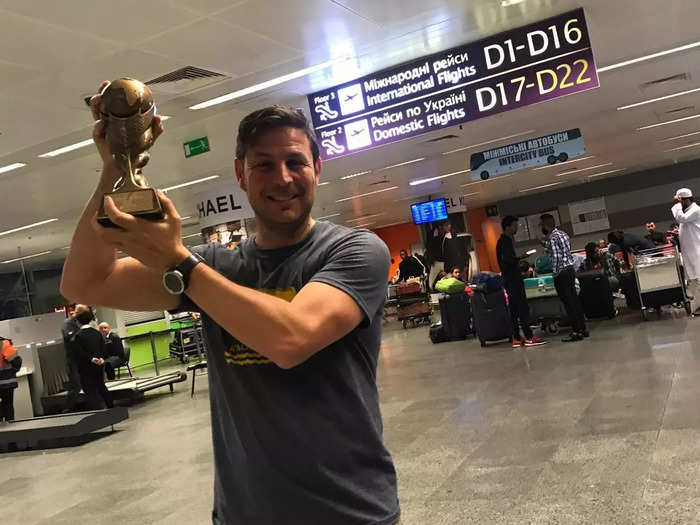
I grew up in Australia, which made overseas travel a significant financial and time commitment. As a result, all my childhood vacations were domestic.
It wasn't until I was 21 that I traveled abroad for the first time. After saving enough money, I visited Hawaii for 10 days. I loved exploring a new country and learning about a different culture so much, that from there, I set a target of visiting 100 countries before I turned 50.
After college, I was fortunate to get head start on that goal through a marketing job with a large Australia-based travel company, which allowed me to travel extensively. I soon went from minimal overseas travel to regular international business trips. My connections through work also gave me access to discounted airfares and accommodation for personal travel. While my friends spent money on cars and houses, I focused on travel.
I started traveling abroad two to three times a year, and by the age of 45, I reached my goal of 100 countries when I went to Ukraine in September 2018.
When I arrived there, one of my friends was waiting for me at the airport in Kyiv with a banner and a trophy to celebrate the milestone.
I'm now 49 and have since added five more countries to my list. I've also passed on my passion for travel to my twin sons, along with a few key lessons.
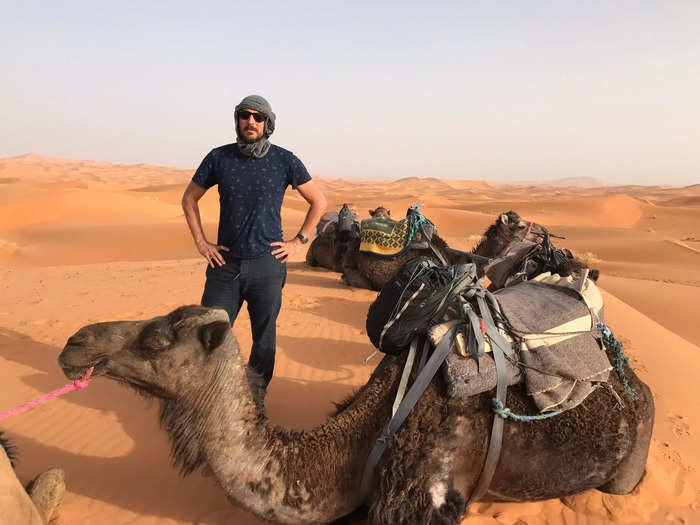
When I returned home, my boys were 12, and I excitedly showed them the trophy and celebratory photos. My milestone inspired them to set the same goal of reaching 100 counties before they turned 50.
They started traveling a lot sooner than I did. We still live in Melbourne, Australia, and I didn't want distance to prevent them from traveling from a young age, as I experienced. So I've always set aside a budget each year for our family to go on an overseas trip.
I have no doubt they will meet that goal quicker than I did. But as they start traveling more, I hope they'll learn from some of the lessons that I've gathered along the way, too.
One of the earliest lessons I learned when I started traveling is that spontaneity is key. Whenever possible, I do what I can to kill the routine on vacation.
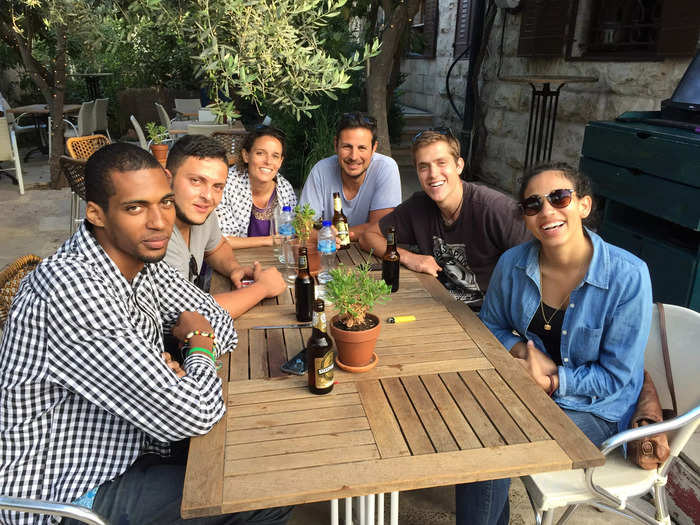
In 2013, I was in Israel, standing in line to visit a museum. I received a text from a friend asking if I'd be interested in going to the West Bank with them for the day.
If I went, it would mean forgoing the museum due to the limited bus schedule. I was torn as I had put together a detailed itinerary for my trip and the museum was highly recommended. But it seemed too good an opportunity to pass up.
My instinct was right. I had a great day, visiting a place I never imagined exploring. And since it was Ramadan, I got to spend Iftar, which is the breaking of the fast, with a local family.
By not allowing myself to be tied down to a minute-by-minute schedule, I was able to have an authentic cultural experience. And the museum will still be there the next time I visit.
From then on, I decided to ditch my extensive travel planning and go with the flow instead. Now, I like to have a rough idea of what I want to see or do in a new place, but allow for flexibility to make impromptu changes.
I have friends who put together detailed Excel spreadsheets that map every minute of their holidays with military precision. In my opinion, this type of routine may work in daily life, but when it comes to travel, leaving room for spontaneity is where you create the strongest memories.
I always take an Australian football with me when I travel. I think it's a great way to meet people and teach them about my home country.
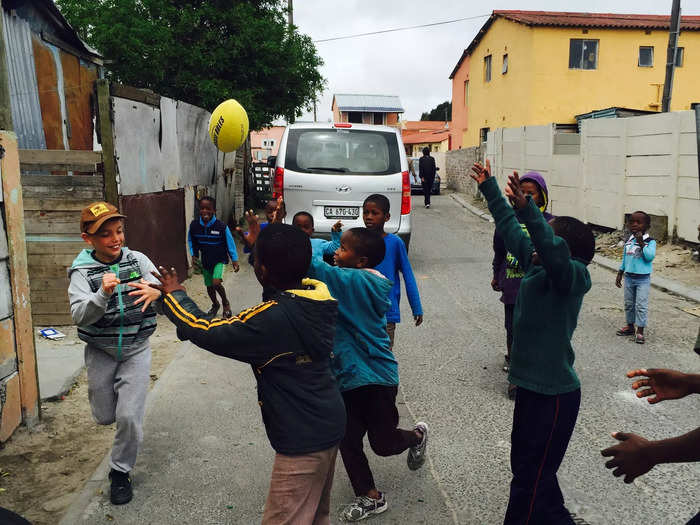
My favorite sport is Australian rules football, which is a game unique to Australia. The oval shape ball is similar in size to an American football and I think it makes for a great way to meet people and engage with locals.
If I am at a park while traveling, I take out my football and ask people if they want to learn a new game. In doing so, I have played Aussie footy with children and adults in places such as Russia, Colombia, and China. Last month I took my ball to a Texas Longhorns football game and got a game happening among the college tailgaters.
My sons have followed my lead with this idea, too. On a trip to South Africa in 2015, I stopped in a small village an hour from Cape Town for a coffee. Some children were playing in the street, and my sons asked if they'd like to learn a new game. None of the children had played Aussie football before, but we soon had an impromptu match happening.
I thought it was a fantastic way for my sons to mix with children around the same age in another country and have a unique travel experience. They agreed, and told me it was the highlight of their trip.
And it doesn't have to be a football. Bringing an item from your home country is a great icebreaker and a good way to engage with locals, in my experience.
I realized that travel offers the chance to hang out with people I wouldn't usually meet. I encourage anyone who travels to spend time with new people.

In 2014, on a business trip to Macedonia, I decided to add a few days in Pristina. It's the capital of Kosovo, and a nearby place I learned that few tourists visited.
I got off the bus and walked to my accommodation when two teenagers approached. I was obviously a tourist, and they were curious as to why I was there.
I mentioned my love of travel, my 100-country challenge, and desire to explore new places. They were excited to meet a foreigner and asked if they could show me around their city.
I was 41; the boys were 17 and had just finished high school. Usually, I would decline such an invitation as I felt concerned about how it may look to others, a middle-aged man with two teenage boys. However, they were so excited to practice their English and speak with a tourist that I said I'd join them for a couple of hours.
My two new friends told me they studied history at school and gave me a city tour that was as good as any I've had from an experienced guide. They also took me to a student restaurant for lunch, and despite being the oldest person there and the only foreigner, it was one of the best meals I've had.
I soon forgot about our age difference and reveled in the experience. The only time their lack of life experience showed was when they took me to see a statue of Bill Clinton and asked if I knew him.
They hadn't met any tourists, Australian or American previously, and naively assumed we all knew each other. Maybe with my greying hair, they thought I was friends with Bill.
I avoid the top TripAdvisor recommendations, preferring to ask a local where they eat. I also try to find small, personalized tours led by locals rather than join big bus tours.
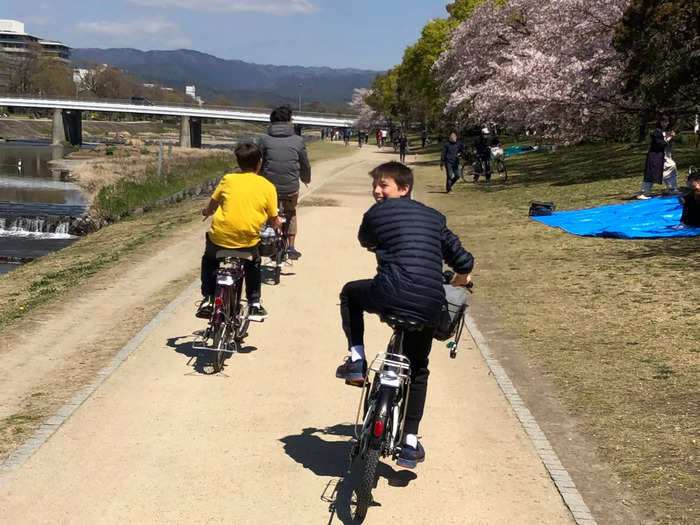
Google has made travel research easy, but it also has its downfalls, in my opinion. I find that many travelers like to follow the same path and head to the same restaurants. I think these places tend to be overpriced and full of tourists. So one thing I always do when I travel is find where the locals eat.
The first time I found a great local cafe was by accident. It was 2008 in Myanmar, and I was looking for somewhere to eat dinner. Unfortunately, I didn't have phone service or a map and got lost trying to find the restaurant recommended in my guidebook. After an hour or so of walking, I found a small cafe. The seats were old milk crates, and there was no menu. There were no other foreigners in sight, either.
A waiter asked me in broken English what I would like to eat. A mix of charades and hand movements followed, but he took my order, and I waited anxiously to see what would be served. I didn't need to worry; that dinner was the best meal I've had on my travels.
If I don't stumble upon somewhere special, I ask any local person I meet where they would get a coffee or a beer. I find these places are more memorable than the ones every tourist already knows about.
Similarly, I prefer not to join big bus tours and look for small walking or cycling tours, instead. In my travels, I've found Airbnb Experiences to be an excellent resource in finding locals offering a more authentic experience than on a bus with 50 other tourists.
Since my children love to cycle, when we visited Kyoto in 2019, I found an Airbnb Experience offering a personalized cycling tour of the city. The local guide took us to markets, temples, and through his local neighborhood. Many of the places we visited were ones we never would have found ourselves, I thought. My kids were especially excited when he took us to his favorite candy store. Since then, it's been one of my favorite ways to connect with locals in a new place and see the city through their lens.
I know it can be tempting to sleep in, but don't. When you look back, you won't remember how tired you were, but you will remember your experience.
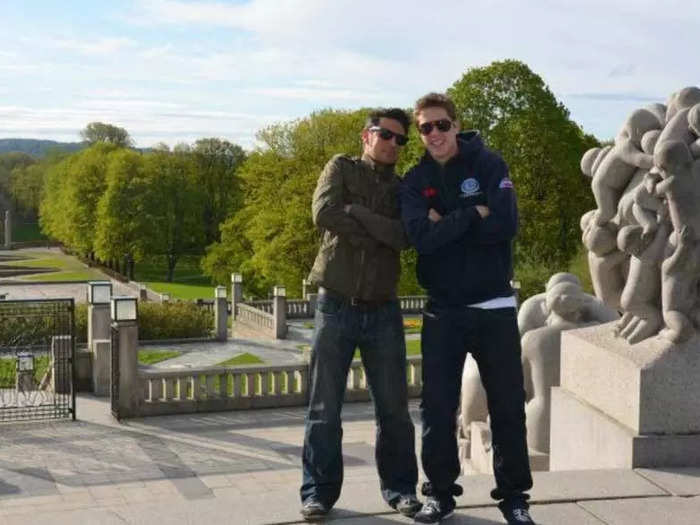
My last point is the most important to me, and one I tell everyone who goes on vacation.
In 2012, I was in Norway, traveling with my cousin, Yonatan. It was our last night in Oslo, and we were out late, only getting back to the hotel at 2 a.m.. We were due to fly home at 9 a.m. the next day, and I was disappointed that we hadn't visited Frogner Park, which is the world's largest sculpture park made by a single artist.
Yonatan said if we set our alarms for 5 a.m., it would give us two hours to explore Frogner before leaving for the airport. I was concerned that I'd be too tired the next day with only three hours of sleep. Then, Yonatan told me something that has stuck in my mind ever since.
"In a few years, you won't remember how tired you were, but you will remember the fun you had visiting Frogner Park."
We awoke at 5 a.m. and headed to Frogner, where we were the only people in the park. We watched the sunrise and admired the sculptures, creating many new memories that I will never forget.
On the flight home, I realized my cousin was right. The photos I took and the memories I made were far better than a few hours of extra sleep.
I've put this mentality into practice with my children, too. In September, we visited Disney World, and despite their desire to sleep in, we woke up at 6 a.m. each day to be among the first at the theme parks. This allowed us to do all the rides we wanted before the crowds arrived. They learned that when it comes to travel, "if you snooze, you lose!"
I'm sure that's another reason why they will get to 100 countries far quicker than I did.
Popular Right Now
Popular Keywords
Advertisement